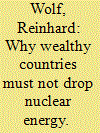| Srl | Item |
| 1 |
ID:
090166


|
|
|
|
|
| Publication |
2009.
|
| Summary/Abstract |
Despite cosmopolitanism's concern for the world's poor and its concomitant heavy moral demands, cosmopolitans establish a limit to the self's responsibility for the global poor. This contrasts with Emmanuel Levinas's view that the self has an infinite responsibility for the other, a responsibility that derives from the self's questioning of the impact of his freedom on others. From a Levinasian perspective, cosmopolitanism's restriction of the self's responsibility for others creates a sphere of rightful indifference to the needs of the other; lends legitimacy to a disregard of the other; forestalls an ethical awakening to the other; constrains the achievement of a more just global order, given that, from a Levinasian perspective, a better justice is built on the self's open-ended responsibility for the other; and points to a tension at the heart of cosmopolitanism, considering the coexistence of elements that both frustrate and aspire to the achievement of global justice. It is concluded that the achievement of cosmopolitanism's goals would require the acceptance of an open-ended responsibility for the other.
|
|
|
|
|
|
|
|
|
|
|
|
|
|
|
|
| 2 |
ID:
138347


|
|
|
|
|
| Summary/Abstract |
Current estimates indicate that several hundred thousand deaths per year can be attributed to climate change. Developed countries have reacted to this growing disaster by increasing the use of renewable energies, but what is to be done with the additional electricity thus generated? Should it be used for cutting back coal-fired energy production or can it be used for substituting nuclear energy? Priority must be given to replacing coal power, since developed countries have a strong duty to minimize the physical harm caused by their electricity generation. Dropping nuclear energy prior to coal power cannot be justified because the risks of nuclear energy pale in comparison to the suffering that emissions from coal-fired plants inflict both on their host countries and on poorer countries in the global South that (a) do not benefit from this energy and (b) have far less capacity to cope with the effects of climate change or other environmental damages. This article argues that when faced with a choice between operating coal-fired power plants or nuclear reactors, governments are obliged to opt for nuclear energy.
|
|
|
|
|
|
|
|
|
|
|
|
|
|
|
|